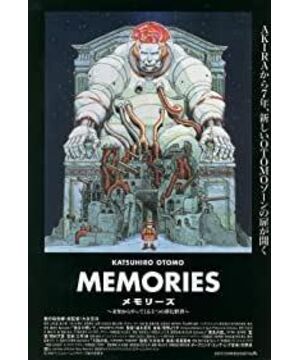In her recollection, the film began to feel a little weird and a little adventurous and sci-fi, which may indicate that exploring the depths of memory itself is an adventure and an unstable state. And the memory of the famous female opera singer, the contrast between the beautiful memory and the decaying real material world, and the cycle of beautiful memories, highlights the eternity of memory. It is not difficult for us to find through the film that the memory of the female opera singer is beautified and adapted by herself, and you can even hide a lot of tears and cover up too much pain, just like the last space, after destruction and reorganization, become a rose . This is the self-beautification of memory by human beings, which extends another meaning of this part, which is the virtuality and distortion of memory. The virtuality and distortion were well explained when the two adventurers went deep into the space. One of the adventurers valued his daughter the most. When shooting with his own machine gun, he did not hit his daughter. When his daughter fell off the roof and fell to her death, rationally, he couldn't hide his pain. The daughter's resurrection was actually the adventurer's own will, and the distortion of the painful memory, and the female opera singer said a real sentence. daughter is here. This tells the adventurer that the understanding of virtually anything exists in memory. Memories can change, but things themselves don't. It expresses the emptiness of memory and the questioning of the world of consciousness. Another adventurer, like the opera singer, is forever intoxicated and remembered, which is what most people choose. You can choose to fight like the previous adventurer, but how many can get out of the comfort of consciousness. Human beings are doomed to be bound by consciousness and cannot escape, and this part is absolutely beautiful and hopeless. Can you break free from the shackles of memory?
The second part, the most stinky weapon, is also the most famous part. It's funny and thought-provoking. The threat to human beings and the environment due to the development of human science and technology is very clichéd content. The only difference is that it is very exaggerated, very funny, very sarcastic. Humans can conquer even the moon, but they have not solved the stench encountered by primitive people. This reminds me of what Fujiwara Sawei said in the Japanese animation "Soul of Chess": "Humans have been able to go to the moon for hundreds of years, but they have to use umbrellas when it rains." This is a mockery of human beings' helplessness. , but I don't think it has much to do with the theme of memory. What I only have is some understanding of current memory. The odor is good for plants, not good for humans. Indirectly leads to the contradiction between man and nature. It's the existing memory. Humans haven't even solved the basic problems. What qualifications do they have to rule the world? It can only be understood in this way.
The third part, the country of cannons. Many people think of it as future anxiety. But I think it is to reflect on the problems left over from Japan's post-World War II education. The issue of the Japanese nation is something we can’t talk about too much. After all, it’s someone else’s business, and the director also expressed it in a European style from abroad, satirizing his own political propaganda, and controlling the spirit of his own people is terrifying.
In fact, the three parts have the most prominent themes, the most delicate part is the first part, and the most profound part is also the first part, which is her favorite memory. Overall, this is not a cartoon, it is an adult film with the help of animation.
View more about Memories reviews










